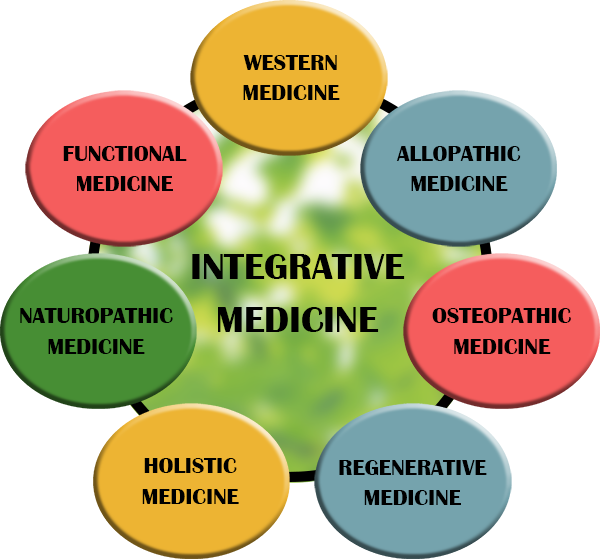Comprehensive Guide to Choosing the Right Holistic Medicine Practitioner for You
Revealing the Recovery Approaches of Functional Medicine and Holistic Medicine for Optimal Well-being
The expedition of functional and holistic medicine exposes unique yet linked paths to wellness. Functional medicine looks for to discover the underlying reasons of disorders, while all natural medicine accepts a larger perspective of well-being that consists of emotional and spiritual measurements. With each other, these techniques provide a structure for people to organize their wellness journeys. This discussion will certainly highlight the principles, practices, and distinctions between these modalities, welcoming additional factor to consider of their consolidated possibility.
Comprehending Functional Medicine: Concepts and Practices
Functional medicine stands for a standard shift in medical care, highlighting a patient-centered approach that seeks to resolve the origin and determine root cause of disease (Read More). This design integrates clinical study with clinical experience, watching patients as unique people instead of simple signs of a condition. Specialists of useful medicine utilize a systems biology perspective, discovering the communications between genetic, environmental, and way of living elements that contribute to wellness results
Trick concepts consist of individualized treatment plans customized to the person's particular needs, fostering a collaborative relationship between person and practitioner. Functional medicine also prioritizes precautionary care, concentrating on lifestyle adjustments, nutrition, and anxiety monitoring to support total wellness. This strategy urges individuals to take an energetic role in their health, bring about improved end results and a much deeper understanding of their problems. Eventually, functional medicine intends to bring back equilibrium and promote health, changing the health care experience right into one of empowerment and holistic healing.
The Holistic Medicine Technique: Integrating Mind, Body, and Spirit
While numerous health care techniques concentrate solely on physical signs, all natural medicine emphasizes the interconnectedness of mind, body, and spirit in the search of excellent well-being. Learn More. This integrative approach recognizes that psychological and psychological aspects substantially influence physical health, leading specialists to consider the entire person during therapy. Alternative medicine uses varied strategies, including nourishment, meditation, and way of living changes, to foster equilibrium and consistency within the individual
Experts commonly involve patients in conversations regarding their psychological states, connections, and life experiences, recognizing that these elements can affect general health. By resolving advertising and underlying issues self-awareness, all natural medicine aims to empower people in their recovery trip. This paradigm change encourages a proactive technique to wellness, supporting for preventive measures and lifestyle changes instead than merely dealing with signs and symptoms. Ultimately, holistic medicine seeks to cultivate a deeper connection in between spirit, mind, and body, helping with comprehensive wellbeing and personal growth.
Trick Differences In Between Functional and Holistic Medicine
Although both functional and holistic medicine prioritize detailed client treatment, they vary considerably in their philosophies and methods. Functional medicine stresses a systems-oriented method, focusing on determining and dealing with the underlying sources of conditions. Specialists commonly use advanced diagnostic testing and individualized therapy strategies, which might consist of way of life changes, supplements, and medications to recover equilibrium within the body's systems.
In contrast, holistic medicine takes on a wider point of view, taking into consideration the emotional, spiritual, and ecological aspects affecting an individual's health. It seeks to advertise general wellness with a mix of different therapies, such as yoga exercise, reflection, and acupuncture, alongside standard therapies.
While functional medicine is extra clinically oriented, stressing organic processes, holistic medicine highlights the interconnectedness of various life aspects (Holistic Medicine). Ultimately, both methods seek to improve individual health and wellness, yet their foundational concepts and treatment approaches differentiate them significantly
Usual Conditions Dealt With by Functional and Holistic Medicine
Numerous individuals seek both functional and holistic medicine for a selection of typical health and wellness conditions. These strategies are commonly employed to resolve persistent ailments such as diabetes, hypertension, and autoimmune disorders. Functional medicine concentrates on identifying underlying reasons with detailed evaluations, while all natural medicine emphasizes the interconnectedness of the body, spirit, and mind.
Mental health issues, including anxiousness and depression, are also frequently dealt with within these frameworks, as they consider psychological and psychological factors along with physical signs and symptoms - Read More. In addition, digestion problems like irritable bowel syndrome (IBS) and food sensitivities prevail concerns, with both practices advocating for dietary alterations and way of life changes
Clients may additionally turn to these modalities for problems such as fatigue syndrome and fibromyalgia, where standard therapies may drop brief. By integrating various recovery techniques, useful and alternative medicine goal to cultivate total health and enhance high quality of life for those impacted.
How to Pick the Right Method for Your Wellness Trip
Just how does one identify the most ideal wellness method amidst the myriad of choices readily available? The decision between alternative and functional medicine needs careful factor to consider of private requirements and choices. Originally, one should evaluate their health goals, whether they look for sign alleviation or a deeper understanding of underlying issues. Next, assessing one's clinical history and existing problems can give clearness on which technique may be most useful.
Consultation with health care specialists experienced in both areas can offer beneficial understandings. Understanding the principles of each approach-- practical medicine's focus on biological systems and all natural medicine's emphasis overall person-- can help in making an educated choice. Furthermore, considering individual values and convenience with therapy modalities, such as alternative treatments or dietary changes, is important. Inevitably, a tailored technique that lines up with one's way of living and ideas will cultivate an extra efficient health trip.
Frequently Asked Concerns
Are Functional and Holistic Medicine Covered by Insurance Coverage Strategies?
Insurance policy insurance coverage for holistic and useful medicine varies substantially by plan and provider. Some insurance business might offer partial compensation, while others do not cover these alternate strategies at all, calling for out-of-pocket payments from clients.
Exactly How Lengthy Does Therapy Typically Take in These Approaches?

Can I Combine Functional and Holistic Medicine With Conventional Treatments?
Yes, individuals can incorporate useful and holistic medicine with standard treatments - Holistic Medicine. This integrative strategy might enhance overall wellness, yet seeking advice from health care service providers is necessary to assure safety and security and effectiveness in handling treatment strategies
What Certifications Should Practitioners of These Strategies Have?
Professionals of practical and alternative medicine need to possess appropriate levels in medicine or wellness scientific researches, alongside specialized training in their particular areas. Accreditations from recognized organizations boost reliability and assurance adherence to developed criteria of care.
Exist Details Diets Recommended in Functional or Holistic Medicine?

In practical and alternative medicine, certain diet plans often consist of whole foods, plant-based options, and elimination diet plans customized to individual needs. Emphasis exists on nutrient thickness and staying clear of refined foods to improve overall health and wellness and wellbeing.
